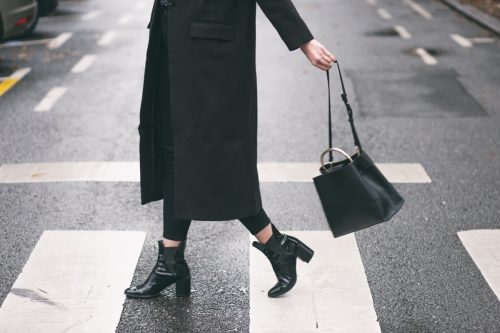Wearing This Can Make You Look Less Attractive, New Study Says

We all want to put our best face forward, which for many of us means our own unique sense of style. But even if you’re nowhere near a fashionista, odds are you put at least some thought into what you wear. Understanding what colors, shapes, and styles compliment your body can be helpful, as well as what kinds of clothes and accessories don’t work so well. When it comes to the latter, it may feel like personal preference, but according to a new study, there’s something specific you could be wearing each day that actually makes you look less attractive to others. Read on to find out what research suggests could be dragging you down.
READ THIS NEXT: Wearing This One Thing Makes You Instantly More Attractive, New Study Says.
Researchers have evaluated what makes you more attractive.

There have been several studies related to clothing and how they affect your appearance. One 2021 study published in Color Research & Application found that the most attractive color in terms of fashion was black, followed by pink and then yellow. Data suggests that these colors are “distinctive,” and black, specifically, makes people appear to have desirable traits or qualities.
Another study published in Jan. 2022 suggested that wearing a blue medical face mask made people look more attractive, which is something we likely would not have discovered without going through the COVID-19 pandemic. But now, the latest research suggests there’s something else you’re putting on your face that you might want to reconsider.
Participants evaluated others on a scale of one to 10.

A March study published in the journal Cureus found that wearing glasses could actually make you appear less attractive, as well as less confident. Interestingly, the study further found that glasses made people seem less intelligent.
Participants were shown eight photos of four people pictured both with and without glasses. Photos showed men and women of college age with Arabic features. Participants were then asked to rate each pictured person on a scale of one to 10 when it came to attractiveness, confidence, and intelligence.
The pictures where people were not wearing glasses had “significantly higher ratings for all domains” when they were compared with photos of the same people with glasses. When it came to attractiveness, most photos of participants without glasses yielded “significantly higher attractiveness scores.”
For more style advice delivered straight to your inbox, sign up for our daily newsletter.
The study focused on college students.

A total of 517 students in Jordan, who had an average age of 22, participated in the study. Of the participants who evaluated photos, 67 percent didn’t wear glasses themselves, and 88 percent hadn’t undergone refractive surgery (commonly referred to as LASIK).
The authors noted that most studies evaluating impacts of eyeglasses have been done on Western study samples, “and their findings were variable.” But in developing countries, this hasn’t been as well assessed.
“The effect of wearing eyeglasses on intelligence perception varied among different areas and ethnicities,” study authors wrote. “While our study showed a negative impact of wearing eyeglasses on intelligence rating, studies on western populations found a positive impact on intelligence perception for images and people wearing eyeglasses, where this variability is probably due to different cultural associations with wearing eyeglasses.”
They pointed to a study in France, where glasses were associated with “higher socio-professional status,” and older studies of Western populations showing the positive impact of glasses on intelligence perception. They also called attention to a potential “social stigma” about wearing glasses among Jordanian people and the potential to affect findings. Considering this, experts say results should be taken with a grain of salt.
There are limitations that should be addressed.

As with any research study, there are certain limitations, and the study authors noted that they didn’t assess the effect of different glasses rims, facial features, or other components that could influence attractiveness perceptions. In addition, in the U.S. and other Western movies and TV shows, glasses are regularly associated with intelligence, and it’s not until someone takes their glasses off that they suddenly become beautiful or attractive. Experts tell Best Life that this factor, as well as the study pool, needs to be considered.
“It is a very limited study in terms of the population to which it applies,” Jay Serle, LMFT, PhD, clinical director of the Ohana Luxury Alcohol Rehab, explains. “I don’t think that the study would necessarily apply, for instance, to American or British students. There would likely be different results among various populations due to different cultural associations with wearing glasses.”
Carol Queen, PhD, Good Vibrations Staff Sexologist, agrees, adding that the researchers stated they performed the study to add “cultural context,” and it is specific to college-aged students. “It’s not generalizable knowledge; it’s a data point, and we can’t tell by looking at the write-up whether it has elements that would definitely make it un-generalizable,” she says. “So we have to be cautious in referring to it.”